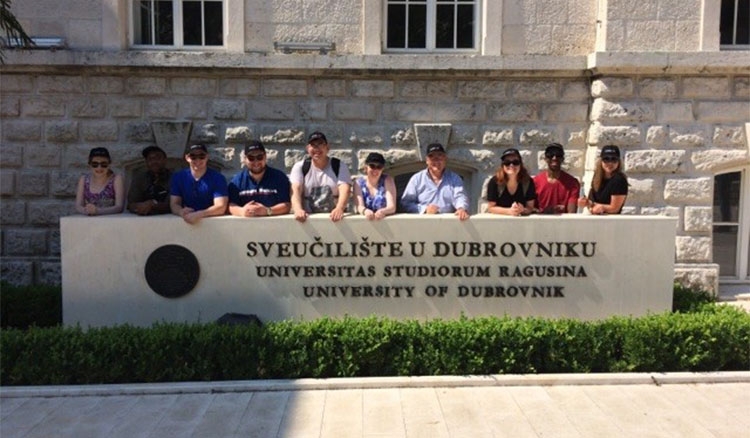 Since 2014, DePaul students have taken two trips to Croatia to work with their counterparts at the University of Dubrovnik to develop a video game focused on civic education and democracy. A third trip will be made at the end of January. (Image courtesy of Dick Farkas)
Since 2014, DePaul students have taken two trips to Croatia to work with their counterparts at the University of Dubrovnik to develop a video game focused on civic education and democracy. A third trip will be made at the end of January. (Image courtesy of Dick Farkas)
For most people born in the United States, civics is a fundamental subject studied throughout their early education. Think back to 7th, 8th or even 12th grade - most students likely had to pass a state-mandated civics exam before they were allowed to graduate middle or high school. However, for some new countries, such as Croatia, civic education is an unfamiliar concept. That's where DePaul University comes in.
Since 2014, DePaul students have worked with their counterparts at the University of Dubrovnik in Croatia to develop a video game focused on civic education and democracy. Dick Farkas, a professor of political science, began the class as part of the Global Learning Experience program, aiming to teach students about politics, civic engagement and societal development around the world. Throughout the course, students compared the United States' old democracy to Croatia's very new one - Croatia adopted its constitution in 1990 and gained its sovereignty post-conflict in 1995.
"In the second year of this GLE program we realized the Croatian public school system is basically devoid of any fundamental notions of politics, including essential compromise and the challenges of policy development," Farkas says. "Our DePaul students recognized that and wanted to find a way to help."
After numerous talks about how to educate the next generation of engaged citizens and several visits to both the United States and Croatia, both groups of students decided an interactive video game might work best - rather than a paper pamphlet or a simple website. In hopes of building a larger collaboration to reach their goal, the team reached out to DePaul's own game design experts. In fall of 2016, Farkas co-taught a course in the College of Computing and Digital Media with Doris C. Rusch, an associate professor of game development and a recognized expert on designing games for constructive purpose.
In the video game, groups of extraterrestrial beings visit Earth. Throughout the gameplay, users interact and negotiate with the aliens and other key players in the game, make decisions based on various aspects of their political interests and come to understand how those decisions affect the different parties involved. After positive feedback from their Croatian counterparts, the DePaul students continued through 2017 to development the game here in Chicago.
"The resources at DePaul and in the College of Computing and Digital Media are incredible," Farkas says. "Thanks to the hard work of two of the CDM's graduate students - Kat Keating and Matt Novosell - we now have a version of the game ready to test with our Croatian counterparts."
Supported by an Erasmus Plus grant, at the end of January, four DePaul students - Michael Mulligan, Claire Wendt, Patsy Newitt and Timmy Arnold - will travel to Croatia to present the video game to members of the University of Dubrovnik and test the game in several Croatian high schools. If all parties react well to the game, the team plans to present it to the Croatian Ministry of Education for further distribution.
"It's incredible to think of our students making such a significant contribution to the political education of students abroad," Farkas says. "This is a great example of how a GLE course can develop into something concrete and meaningful."